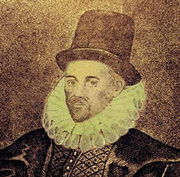William Gilbert
2007 Schools Wikipedia Selection. Related subjects: Historical figures
| William Gilberto | |
|---|---|
|
Dr William Gilbert (Gilberd)
|
|
| Born | 1544 Colchester |
| Died | 1603 London |
William Gilbert, or less commonly Gilberd, was born May 24, 1544, Colchester, England and died November 30, 1603, in London, probably of the plague.Gilbert was an English physician to Elizabeth I and James I and natural philosopher known for his investigations of magnetism and electricity. Gilbert was the originator of the term "electricity" and many regard him as the father of electrical engineering or father of electricity.
His primary work was De Magnete, Magneticisque Corporibus, et de Magno Magnete Tellure (On the Magnet and Magnetic Bodies, and on the Great Magnet the Earth) published in 1600. In this work he describes many of his experiments with his model earth called the terrella. From his experiments, he concluded that the Earth was itself magnetic and that this was the reason compasses pointed north (previously, some believed that it was the pole star ( Polaris) or a large magnetic island on the north pole that attracted the compass). In his book, he also studied static electricity using amber; amber is called elektron in Greek, so Gilbert decided to call its effect the electric force.
Gilbert strongly argued that electricity and magnetism were not the same thing. For evidence, he (incorrectly) pointed out that electrical attraction disappeared with heat, magnetic attraction did not. It took James Clerk Maxwell to show electromagnetism is, in fact, two sides of the same coin. Even then, Maxwell simply surmised this in his A Treatise on Electricity and Magnetism after much analysis. By keeping clarity, Gilbert's strong distinction advanced science for nearly 250 years.
Gilbert's magnetism was the invisible force that many other natural philosophers, such as Kepler, seized upon, incorrectly, as governing the motions that they observed. While not attributing magnetism to attraction among the stars, Gilbert pointed out the motion of the skies were due to earth's rotation, and not the rotation of the spheres, 20 years before Galileo, see external reference below.
A unit of magnetomotive force, also known as magnetic potential, was named the gilbert in his honour.
Whilst today he is generally referred to as William Gilbert, he also went under the name of William Gilberd. The latter was used in his and his father's epitaph and, also, in the records of the town of Colchester, which would indicate that this is the most correct - see Biographical Memoir in De Magnete. Also, The Gilberd School in Colchester, named after Gilbert, would seem to confirm this.
